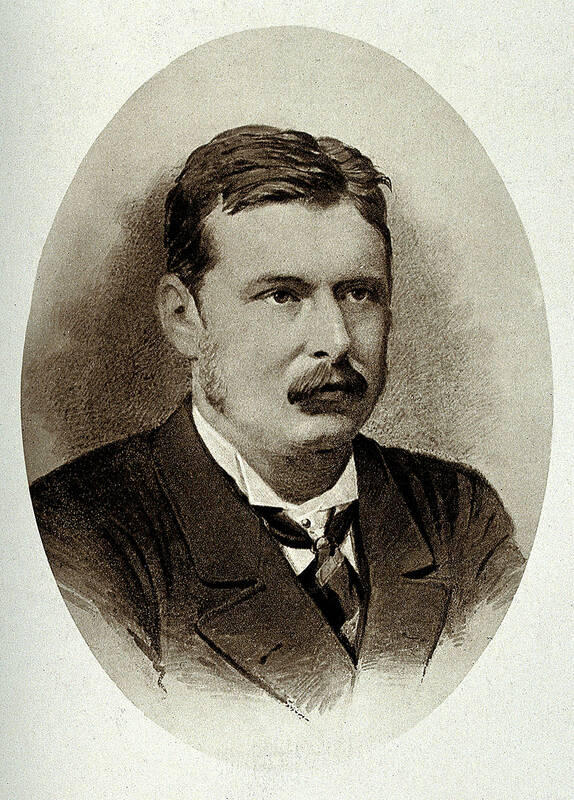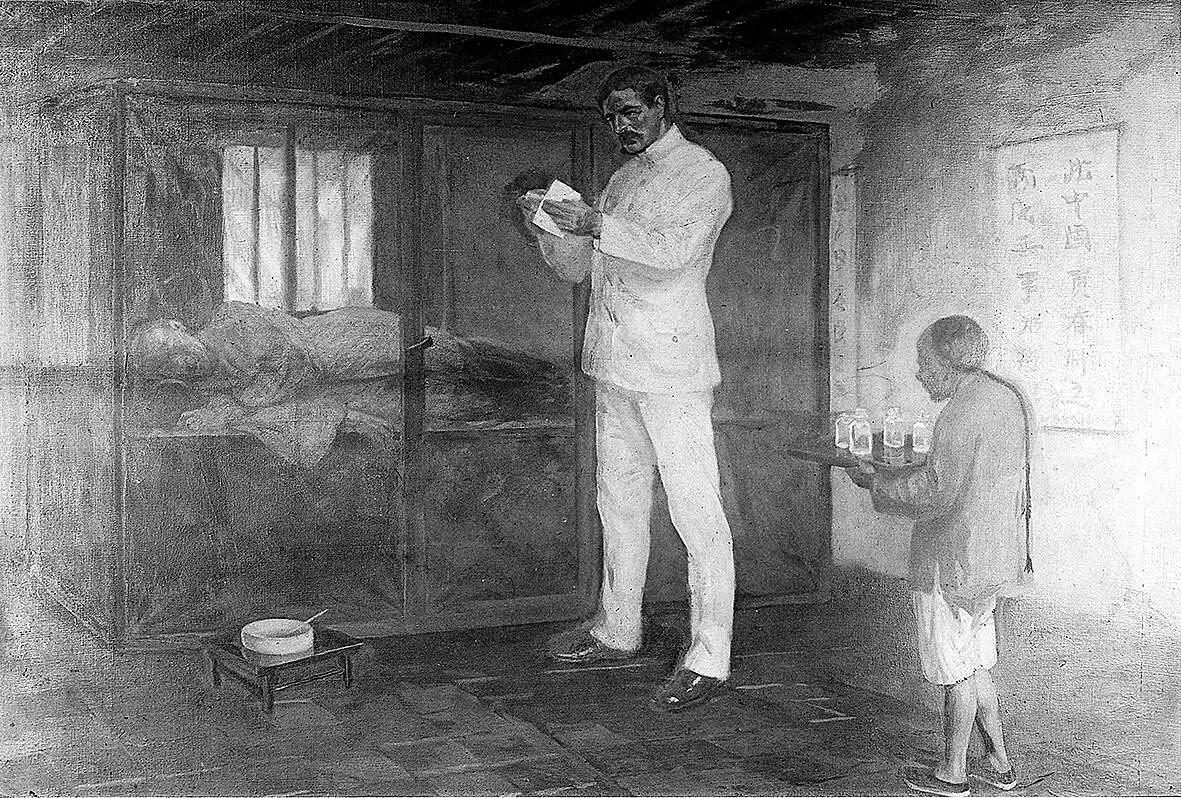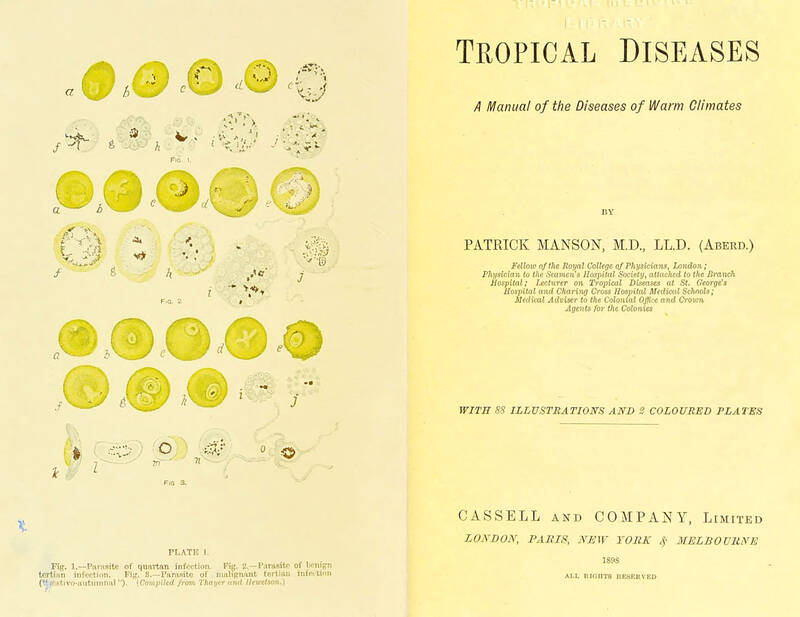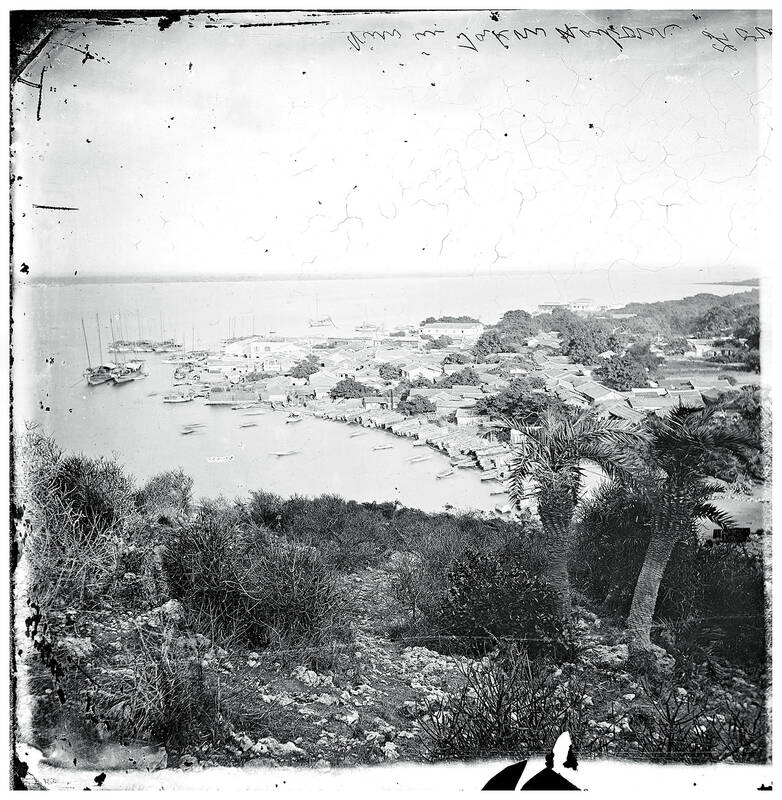April 8 to April 15
Westerners in the late 1800s had such a poor opinion of Taiwan that they were often shocked that Patrick Manson managed to spend five years here.
“Good heavens, how could you exist for so long in an outlandish hole? You could have no society there, no amusements, a blazing sun and murderous savages,” they would say, and when Manson tried to explain that he actually liked living there, they pitied him, doubting his “truthfulness or sanity.”

Photo courtesy of Wikimedia Commons
“If a man derives his pleasure from billiards, good dinners, small talk, a game at whist and the latest novel — he had better keep away from Formosa,” the former medical officer for the customs office in Takao (today’s Kaohsiung) writes in the 1873 article “A gossip about Formosa” published in the China Review. “But if his taste is for lovely scenery, a roving life, a clear sky, kindly people, a little adventure and plenty of shooting, let him try our island.”
Arriving in 1866 at the age of 21, Taiwan was Manson’s first stop in his career. It was here that he honed his medical and research skills with minimal supervision and equipment, and developed an interest in studying tropical diseases such as malaria, leprosy and elephantiasis.
Years later, Manson became the first person to demonstrate that mosquitoes can transmit pathogens through studying the filaria sanguinis-hominis parasite, and posited that malaria is also spread via the insect, which today we know to be true. After leaving Taiwan in 1871, Manson concluded his career in Xiamen and Hong Kong and at the Tropical Medicine Conference in 1913, he was honored as the “father of tropical medicine.”

Photo courtesy of Wikimedia Commons
He died on April 9, 1922. A plaque in his hometown of Aberdeen states that he is the “first to show that insects carry disease.”
WESTERN DOCTORS ARRIVE
In 1858, the Treaty of Tianjin forced the Qing Dynasty to open up Kaohsiung, among other ports in Taiwan, for trade with the West. The British established a consulate in Tamsui in 1861, and moved it to Kaohsiung in 1864. This also led to the arrival of Western physicians, beginning in 1865 with James Maxwell — who was also the first Presbyterian missionary to Taiwan.

Photo courtesy of Internet Archive
Manson was born in 1844 near Aberdeen, Scotland, and obtained his doctor of medicine in 1865 from the University of Aberdeen. Armed with just seven months of experience as an assistant medical officer in a mental asylum, Manson boarded a ship for Taiwan.
Chu Nai-shin (朱迺欣) writes in a Taiwan Medical Journal (台灣醫界) article that there was a lack of domestic job prospects then for Scottish medical graduates compared to their British counterparts, and many found work overseas either with the military or with the colonial medical service. Manson had also accrued significant student debt, and was in dire need of a job to pay it off.
Phillip Manson-Bahr writes in The Life and Work of Sir Patrick Manson that Manson was “soon tired of mental work within the confines of an asylum, but his adventurous spirit found an opening when, through the interest of his elder brother, then in Shanghai, he obtained the appointment of a medical officer for Formosa.”

Photo courtesy of Wellcome Collection
The position was established by customs service inspector-general Robert Hart, who, according to Manson-Bahr, “recruited most of his medical officers from Scottish schools.” Manson’s job was to inspect the arriving ships for diseases, supervise the sanitation of the port and serve the tiny European community of about 16 people. Medical services were strongly needed in tropical areas of British interest, which were dubbed the “white man’s grave” as countless succumbed to various diseases.
Hart also instructed Manson to regularly report on the climate, local conditions and illnesses that affected locals, and his earliest studies were published in the custom service’s Medical Reports.
EXCURSIONS INLAND
Manson also regularly helped out at Maxwell’s clinic, eventually taking it over in 1869 when the missionary moved to Tainan.
Kelvin KW To and Kwok-Yung Yuen write in an Emerging Microbes and Infections article that at the clinic, Manson was “exposed to a wide variety of illnesses from elephantiasis to leprosy for his postgraduate training without any supervision,” and that “his only research tool was a combination of clinical skill, hand lens and good record keeping.”
The port wasn’t particularly busy during those days, and Manson spent his free time riding horses, hunting, gardening, swimming and fishing. He visited indigenous villages to observe the customs and endemic diseases there.
He describes some of his excursions inland in the “gossip” article, going into detail about the scenery and culture he observed. Particularly interesting is his writing on the plight of the indigenous Pingpu of the plains, where he uses “Chinaman” to refer to Taiwanese who claim ancestry from Fujian Province in China, while the Hakka are a separate group.
“Strange how the Chinaman has succeeded in completely ousting the original dwellers in his land, robbing him of his fat plains and pinning him into a narrow strip of stony, unfruitful ground at the foot of the hills, the bear-hunting savage on one side of him, the thieving Hakka on the other and starvation and want in his house,” he writes. “The Hakka preys upon him as soon as he has anything to steal, and the Chinaman on both.”
“And so we feel, that not many years hence, the [Pingpu] of Formosa will be numbered among the extinct races, without a relic to mark their former existence, not a stone of their own raising, only a short notice in some ancient Dutch book … their language is dead already, only once have we met anyone who speaks it.”
Curiously, he notes that the Pingpu had more of an affinity to Westerners since they were both called fan (番, savages or foreigners) by the Han Taiwanese.
THE MANSON LEGACY
It’s not exactly clear why Manson left Taiwan in 1871, but it might have something to do with the Mudan Incident (牡丹社事件), which happened the same year. The killing of 54 shipwrecked Ryukuan sailors who had accidentally wandered into indigenous territory brought Japan into contention with the Qing Dynasty over Taiwan, and some sources say Manson had angered the Japanese by procuring horses for Qing forces. Other accounts say that he became involved in a dispute between Han Taiwanese factions. In any event, the British Consular strongly advised him to leave for Xiamen.
His younger brother David Manson took over his duties after his departure. David stayed in Taiwan for four years before also heading to China, where he died from disease in 1878. To commemorate his service, then-customs medical officer William Wykeham Myers collected donations and founded the David Manson Memorial Hospital in today’s Cijin District (旗津) that same year. It consisted of two buildings and the facilities were consider}ed quite advanced for its time.
The hospital established Taiwan’s first Western medical school in 1884, which adhered to Scottish educational standards. It continued to operate after the Qing ceded Taiwan to Japan in 1895, but ceased to provide medical services in 1910. It was razed in 1937.
Taiwan in Time, a column about Taiwan’s history that is published every Sunday, spotlights important or interesting events around the nation that either have anniversaries this week or are tied to current events.

April 14 to April 20 In March 1947, Sising Katadrepan urged the government to drop the “high mountain people” (高山族) designation for Indigenous Taiwanese and refer to them as “Taiwan people” (台灣族). He considered the term derogatory, arguing that it made them sound like animals. The Taiwan Provincial Government agreed to stop using the term, stating that Indigenous Taiwanese suffered all sorts of discrimination and oppression under the Japanese and were forced to live in the mountains as outsiders to society. Now, under the new regime, they would be seen as equals, thus they should be henceforth

Last week, the the National Immigration Agency (NIA) told the legislature that more than 10,000 naturalized Taiwanese citizens from the People’s Republic of China (PRC) risked having their citizenship revoked if they failed to provide proof that they had renounced their Chinese household registration within the next three months. Renunciation is required under the Act Governing Relations Between the People of the Taiwan Area and the Mainland Area (臺灣地區與大陸地區人民關係條例), as amended in 2004, though it was only a legal requirement after 2000. Prior to that, it had been only an administrative requirement since the Nationality Act (國籍法) was established in

With over 80 works on display, this is Louise Bourgeois’ first solo show in Taiwan. Visitors are invited to traverse her world of love and hate, vengeance and acceptance, trauma and reconciliation. Dominating the entrance, the nine-foot-tall Crouching Spider (2003) greets visitors. The creature looms behind the glass facade, symbolic protector and gatekeeper to the intimate journey ahead. Bourgeois, best known for her giant spider sculptures, is one of the most influential artist of the twentieth century. Blending vulnerability and defiance through themes of sexuality, trauma and identity, her work reshaped the landscape of contemporary art with fearless honesty. “People are influenced by

The remains of this Japanese-era trail designed to protect the camphor industry make for a scenic day-hike, a fascinating overnight hike or a challenging multi-day adventure Maolin District (茂林) in Kaohsiung is well known for beautiful roadside scenery, waterfalls, the annual butterfly migration and indigenous culture. A lesser known but worthwhile destination here lies along the very top of the valley: the Liugui Security Path (六龜警備道). This relic of the Japanese era once isolated the Maolin valley from the outside world but now serves to draw tourists in. The path originally ran for about 50km, but not all of this trail is still easily walkable. The nicest section for a simple day hike is the heavily trafficked southern section above Maolin and Wanshan (萬山) villages. Remains of